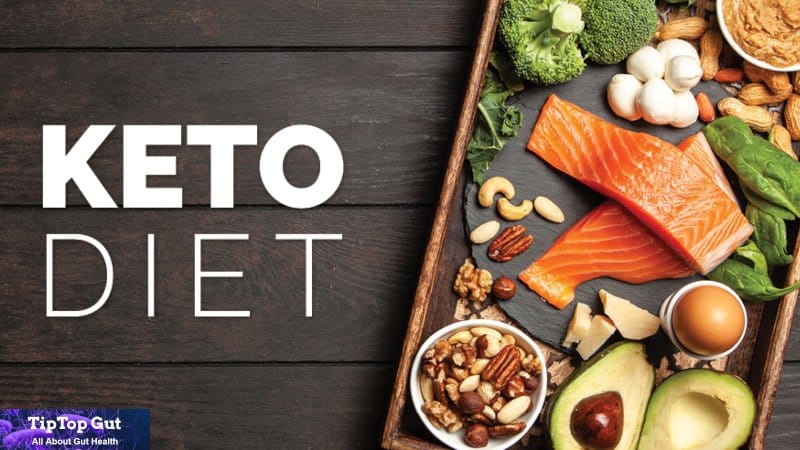More than a century ago, the ketogenic, or keto, the diet was introduced to treat epileptic youngsters. A more widely accepted variation of the diet is now less restrictive. Here, you’re going read is keto good for gut health.
What is Keto Diet?
A high-fat, extremely low-carb diet is the ketogenic diet. Meals contain 70–80% fat and 5–10% carbohydrates. Normally, your body converts carbohydrates into glucose, which gives you energy.
When your body changes to burning ketones, which are produced from fat if you don’t consume a lot of carbohydrates called the ketosis state.
Although the ketogenic diet was initially created to treat epilepsy, it has now gained appeal as a weight loss diet that promotes general health. Keto is debatable, though. The diet flips the food pyramid and goes against everything we often associate with a healthy diet. Consider the keto macronutrient ratio:
- 5%–10% of calories come from carbs.
- Protein accounts for 20–25% of calories.
- Calories from the fat range between 70 and 80 per cent.
Is Keto Good for Gut Health?
The delicate ecosystem inside your gut significantly impacts your general health. These vital microbes support most critical bodily systems, such as the brain and immune system. The gut flora is also quite susceptible to the foods you eat. Your everyday dietary habits might positively or negatively impact the composition and health of your microbiome.
It is crucial to comprehend how these changes can affect the microbiota positively and negatively because they can significantly affect your general health. These outcomes include the effectiveness of numerous bodily processes, such as the digestive and immunological systems.
The gut microbiome is known to undergo significant alterations due to the keto diet, which are mediated through variations in the metabolites that the gut bacteria generate.
A recent study demonstrated that a low-carb diet like the ketogenic diet could significantly enhance gut health. During the research, it was observed that ketone bodies had an anti-inflammatory effect on the gut flora.
The results suggest that using ketones may be feasible for autoimmune diseases that affect the gut, like Irritable Bowel Syndrome (IBS). Researchers also found that adding ketones caused microbial alterations in mice fed regular quantities of carbs.
This is a highly intriguing discovery because it implies that the impact of ketogenic diets on the microbiome is not simply related to the diet itself but also to how the diet modifies the body’s metabolism, which indirectly impacts the microbiota.

Benefits of Keto for Gut Health
There are several other ways that keto supports gut health and boost gut flora. Here, only a handful of those benefits are discussed.
- Keto can shield the lining of the stomach – The health and functionality of the gut lining are improved when the intestines and small intestines are less inflamed. Your general health also improves due to a healthy gut lining.
- Keto can ease IBS symptoms – There is proof that the ketogenic diet is helpful for irritable bowel syndrome with a diarrheal predominance (IBS). Inflammation has also been connected to irritable bowel syndrome.
- Growth of specific helpful bacteria increases – The microbiome’s diversity of bacteria specialized in fat metabolism and digestion may increase due to ketosis. In addition to enhancing stomach digestion and stimulating vital immune cells, these bacteria are well known to be advantageous to overall health. Ackermansia, Firmicutes, Lactobacillus, Bacteroidetes, and Bacteroidetes are a few.
- Keto can lower the risk of colon cancer – Cancer cells are known to run out of their primary fuel, glucose when following a ketogenic diet. Low-carb diets, especially those enriched with omega-3 fatty acids, have been demonstrated in studies to slow the spread of colon cancer.
- Bad bacteria can be starved by keto – Western-style diets frequently cause an overgrowth of harmful gut bacteria and a decrease in the variety of the microbiota. By cutting out processed foods and refined carbohydrates, a ketogenic diet increases microbiome diversity and helps battle dangerous bacteria.
Read More:
Biotics 8 Review: SCAM or A Legit Probiotic for Men?
Effects of Keto on Your Gut Health
Keto has benefits, but it affects the gut’s health in exceptional cases.
More intestinal inflammation
A high-fat diet raises the gut’s Desulfovibrio bacteria, which can generate hydrogen sulfide. This substance weakens the mucosal barrier of the bowel and produces colitis or colon inflammation.
Reduce the diversity and richness of the gut microbiome
Bacteroides spp., E. coli, and A. muciniphila are a few of the bacteria species that a ketogenic diet reduces. These bacteria are involved in the digestion and metabolism of high-fat foods.
Additionally, this diet reduces the populations of organisms, including Faecalibacterium spp., bifidobacterium, E. rectale, and E. dialister, that are involved in the digestion of complex carbohydrates.
Due to the diet’s low complex carbohydrate content, essential for the microbes to produce energy, the microbiome’s overall variety and richness decline. Increased gastrointestinal illness and harmful bacteria
Increased gastrointestinal illness and harmful Bacteria
There is also a reduction in the good bacteria that protect the stomach from infections and chronic illness. Pathogenic bacteria, such as Escherichia coli and Desulfovibrio, become more prevalent when variety is reduced. IBS, necrotizing enterocolitis, and colorectal cancer have all been found to be more common in people who lack helpful microorganisms.
Expected Outcomes of Keto for Gut Health
You should be concerned about the diversity and health of your gut microbiome. Before starting one, you should properly analyze all the advantages and disadvantages of a ketogenic diet. It’s crucial to be proactive in caring for your microbiota during the keto diet if you decide that’s the route you want to go.
By eating foods that are compatible with the keto diet and are rich in fibre, prebiotics, and probiotics, many people have found success in enhancing their microbiomes. These include fermented meals, nuts and seeds, and vegetables low in carbohydrates. It’s also crucial to incorporate high-quality supplements, such as a prebiotic or probiotic from BIOHM, into your daily routine to support the health of your gut microbiota.
In this manner, you can take advantage of the keto diet’s metabolic advantages while minimizing some of its adverse gastrointestinal side effects.
Read More:
Is Kimchi Good for Gut Health? Truth Revealed with Research (2022)
Types of Ketosis
There are three types of ketosis:
Nutritional Ketosis
A state of ketosis brought on by dietary change is called nutritional ketosis. We shall categorize nutritional ketosis into three subgroups: alcoholic, supplementary, and carbohydrate-restricted.
Carbohydrate-restricted ketosis.
A properly designed ketogenic diet can lead to carbohydrate-restricted ketosis. This strategy is the most popular way to enter a state of ketosis and often produces more of an increase in ketones than an overnight fast.
The most effective strategy for inducing carbohydrate-restricted ketosis is generally agreed to be consuming a high-fat, low-carbohydrate diet (usually below 30 grams), along with modest amounts of protein.
Supplementary ketosis
Consuming supplements like medium-chain triglycerides (MCTs) or exogenous ketones like ketone esters or mineral-bound ketone salts might induce ketosis.
According to some evidence, using ketone esters can raise ketone levels and keep them there longer than using other types of ketone supplements. It’s possible, but not required, for supplemental ketosis to coexist alongside carbohydrate restriction.
Alcoholic ketosis
Since it results from dietary intervention, it can be considered a subtype of nutritional ketosis. As its name suggests, this type of ketosis is brought on by alcohol consumption and results in an acidic internal environment because of the sharp rise in ketone bodies.
AKA can happen to those who drink alcohol often or who are undernourished and drink alcohol. Depending on the degree, alcoholic ketosis can cause nausea and vomiting, exhaustion, breathing problems, and abdominal pain.
The most well-studied illness is drug-resistant pediatric epilepsy, but several chronic conditions have shown significant benefits from supplementary ketosis.
Pathological Ketosis
In particular, diabetic ketoacidosis and pathological ketosis occurs (DKA). One of the reasons ketosis has such a terrible reputation is that DKA, which is likewise characterized by an acidic internal environment, is one of the causes.
In contrast to supplementary or carbohydrate-restricted ketosis, diseased ketosis is caused by unchecked rates of ketogenesis (10–15 mmol), which results in substantially higher levels of ketones.
Fasting Ketosis
When insulin and blood glucose levels drop to a level that promotes more fat-oxidation, which is ultimately followed by more significant ketone generation, ketosis frequently results. After periods of total food restriction, such as an overnight fast, mild ketosis might develop.
A fast causes the body to begin burning more fat and produce more ketones as a result of the liver’s ability to store glucose (glycogen) being depleted. Blood glucose levels continue to fall throughout the fast, and the amount of ketogenesis may increase significantly.
The degree of ketone production and the way that ketosis is induced differ amongst the various forms of ketosis.
Concluding Now: Is Keto Good for Gut Health?
Millions of microscopic bacteria and microorganisms make up the gut microbiome, which supports weight loss, boosts metabolism, and keeps your immune system in good shape.
Gut health contributes to the body’s balance. It’s essential to consume a lot of fibre-rich, anti-inflammatory foods if you want to keep the balance of beneficial bacteria in your gut.
It is demonstrated that the ketogenic diet helps with weight loss and intestinal health. Two other strategies to support gut health are staying hydrated and lowering stress levels.
Better gut health is only one of several justifications for switching to this low-carb, high-fat diet.
Keto dieters only eat 25 to 50 grams of net carbohydrates daily, enabling them to reach the metabolic condition known as ketosis. Because of their metabolic condition, their body uses body fat instead of sugar reserves for energy.
Going keto has been demonstrated to affect metabolism positively and is directly linked to better gut health.
FAQs about Keto and Gut Health
Does keto alter gut flora?
The proportions of the common gut microbial phyla Actinobacteria, Bacteroidetes, and Firmicutes in participants’ guts changed significantly between the standard and ketogenic diets, according to an analysis of microbial DNA in stool samples from the participants. This included changes in 19 different bacterial genera.
How does keto affect your gastrointestinal system?
Fats keep individuals fuller and longer since they take the longest to leave the stomach. When following a ketogenic diet, delayed stomach emptying may cause constant fullness, resulting in abdominal pain, an elevated risk of regurgitation, and heartburn.
Can keto help with intestinal health?
It has been demonstrated that following a ketogenic diet helps with weight loss and intestinal health. Two other strategies to support gut health are staying hydrated and lowering stress levels.
Will a ketogenic diet help my leaky gut?
The good news is that a ketogenic diet can aid in reducing leaky gut symptoms and related health issues. The intestinal barrier disruption and inflammation leading to the leaky gut can be dramatically reduced by a low-carb diet or high-fat diet, such as the ketogenic diet.
Does a ketogenic diet reduce bloating and gas?
A ketogenic diet is a nutritional adjustment that can greatly help you lose weight and attain healthy blood sugar levels while significantly lowering the symptoms of IBS, inflammation, and bloating. You can experience IBS, other digestive and intestinal issues, and their symptoms in many different ways.
Read More:
Best Over the Counter Probiotic for Gut Health: Easy Guide 2022
Best Probiotic for Gut Health and Weight Loss: An Ultimate Guide 2022
Best Probiotic for Vaginal and Gut Health: The Best Guide 2022

















